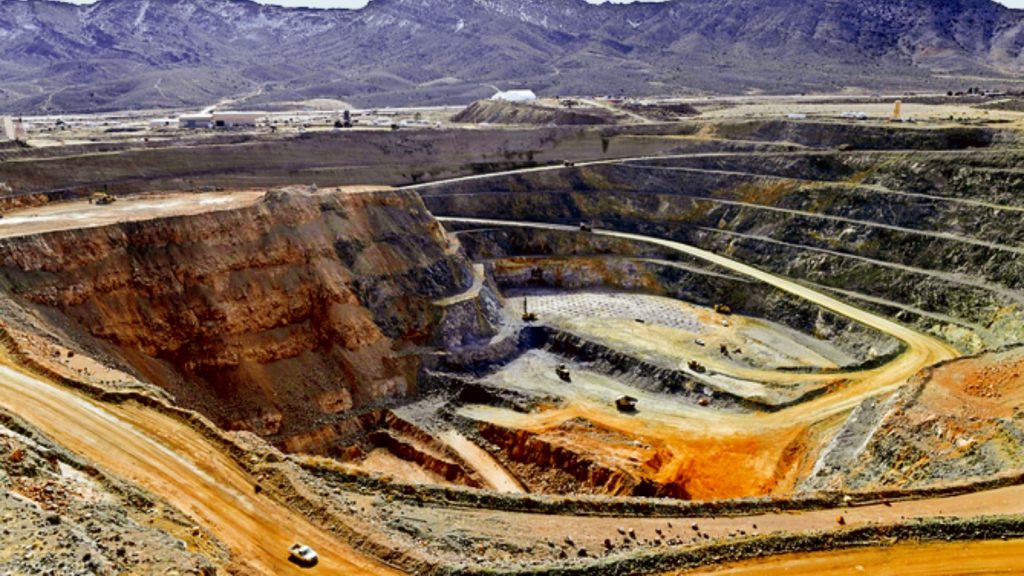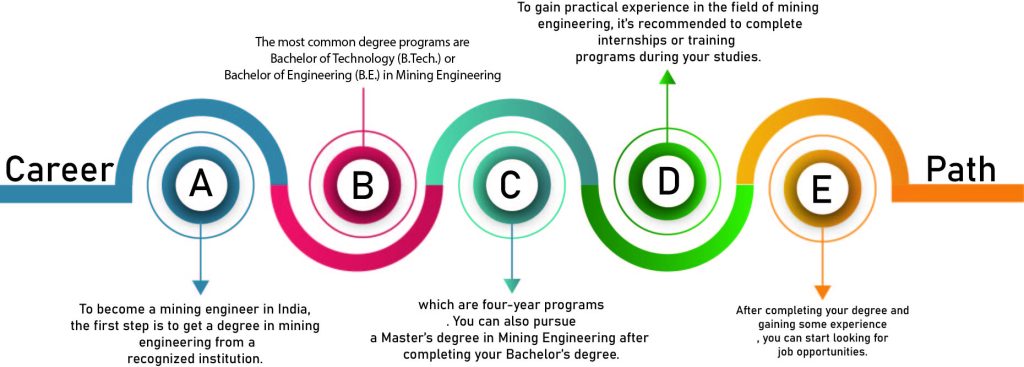Mining engineering is a field of engineering that focuses on the extraction of minerals from the earth's
surface. It involves the study of the processes, techniques, and equipment used to extract, process, and
transport minerals from the earth's crust. Mining engineering covers various aspects of mining
operations, including mine design, planning, construction, and management.

Work description
The work description of a mining engineer includes designing, implementing, and managing mining
projects.
They conduct feasibility studies and evaluate the potential profitability of mining projects.
Develop and design mining plans and layouts to optimize the extraction of minerals.
Oversee the construction of mines and mining facilities, including the installation of equipment and
infrastructure.
Use advanced technology to explore and map mineral deposits and assess their quality and quantity.
Develop and implement strategies to increase the efficiency and productivity of mining operations.
Collaborate with geologists, metallurgists, and other professionals to determine the best methods for
extracting minerals and metals.
Analyze data and prepare reports on mining production, costs, and profits.
High Demand
High demand for mining engineers due to growing global population and increasing
infrastructure development.
Lucrative salaries
Potential for high salary and opportunities for career growth and advancement.
Opportunities for innovation
Involvement in the exploration, extraction, and processing of valuable minerals and resources.
Versatility
Opportunities to work in diverse locations around the world, including remote and exotic
locations.
Flexibility
Involvement in the development and implementation of environmentally sustainable practices.
Job satisfaction
Many computer engineers find the work challenging and rewarding, as they have the opportunity to solve complex problems and make a significant impact in their field.
High stress
Mining can be a dangerous and physically demanding job with exposure to hazardous materials
and conditions.
Long hours
Working in remote or isolated locations for extended periods of time can be mentally and
emotionally challenging.
Competitive field
High level of responsibility and pressure to ensure the safety of workers and the environment.
Constant learning
Fluctuating demand for minerals and resources can result in periods of unemployment or
underemployment.
Isolation
Criticism and opposition from environmentalists and local communities can create additional
challenges for mining engineers.
Eye strain and other physical health issues
Staring at computer screens for long periods of time can cause eye strain and other physical health issues, such as back pain and repetitive strain injuries.
The cost of pursuing a career in mining engineering in India can vary depending on various factors such
as the type of institution, location, and duration of the program.
The cost of pursuing a 4-year Bachelor’s degree in mining engineering in India can range from INR 4-10
lakhs in public institutions to INR 10-25 lakhs in private institutions.
Pursuing a 2-year Master’s degree in mining engineering can cost around INR 3-5 lakhs in public
institutions and INR 6-15 lakhs in private institutions.
Other expenses like living expenses, including accommodation, food and utilities, transportation, book
and supplies, internship and field trip fees also comes under the investment section, and these depends
upon various factors like location, and personal preferences.
Overall, the approximate total cost of pursuing a career in mining engineering in India can range from
INR 10-40 lakhs depending on the factors mentioned above.
[wpcharts type=”horizontalbarchart” bgcolor=”red:gray:yellow,blue:gray:yellow,random:gray:yellow,purple:gray:yellow” min=”0″ legend=”true” titles=”2 year , 5 year” values=”3,7,5,12″]
The earning potential of a mining engineer in India depends on various factors such as the level of
education, experience, and the employer.
The starting salary for a mining engineer with a bachelor’s degree can range from INR 3-8 lakhs per
annum. After gaining a few years of experience, a mining engineer with a bachelor’s degree can earn
around INR 8-20 lakhs per annum. A senior mining engineer with a bachelor’s degree and extensive
experience can earn around INR 20-50 lakhs per annum.
A mining engineer with a master’s degree can expect to earn a starting salary of around INR 5-10 lakhs
per annum. A mining engineer with a master’s degree and a few years of experience can earn around
INR 12-25 lakhs per annum. A senior mining engineer with a master’s degree and extensive experience
can earn around INR 30-70 lakhs per annum.
It’s important to note that salaries can vary significantly depending on the employer and location.
Mining engineers working for government organizations or public sector companies may have a lower
salary range but often receive additional benefits such as job security and retirement benefits. On the
other hand, mining engineers working for private companies may have a higher salary range but may
have less job security.
[wpcharts type=”horizontalbarchart” bgcolor=”red:gray:yellow,blue:gray:yellow,random:gray:yellow,purple:gray:yellow” min=”0″ legend=”false” titles=”Entry-Level, Mid-Career, Senior-Level ” values=”5,15,25,35,45,55″]
Strong mathematical and analytical skills: Mining engineering involves complex calculations
and analysis of data, so having a strong foundation in math and analytical skills is crucial.
Problem-solving skills: As a mining engineer, you’ll be responsible for identifying and solving
problems in the mining process. You should have a strong problem-solving ability to analyze the
situation and come up with an effective solution.
Technical skills: Mining engineering requires technical skills, such as knowledge of mining
equipment, mining software, and surveying tools.
Good communication skills: Effective communication is essential in mining engineering, as you’ll
be working in teams and interacting with stakeholders such as government officials and mining
company executives.
Physical fitness: Mining engineers often work in remote and challenging environments, and
some mining jobs may require physical labor. Having a good level of physical fitness can be an
advantage in this career.
Passion for technology and eagerness to learn.
Strong foundation in math and science.
Weakness in math and analytical skills: Mining engineering involves a lot of calculations and
data analysis, so having weak math and analytical skills can be a significant disadvantage.
Lack of attention to detail: In mining engineering, even small mistakes can have significant
consequences. Students should avoid being careless or lack attention to detail.
Poor time management: Mining engineers often work on projects with tight deadlines. Students
who struggle with time management can struggle in this career.
Inability to work in a team: Mining engineering is a collaborative field that requires teamwork.
Students who struggle to work in a team or lack interpersonal skills may find it difficult to
succeed in this career.
Lack of adaptability: The mining industry is constantly evolving, and mining engineers need to
be adaptable to changes. Students who struggle with adapting to new situations or resist change
may not thrive in this career.
Impatience or inability to work through complex problems.
Tendency to procrastinate or miss deadlines.
Work-life balance
The work-life balance of a mining engineer can vary depending on the specific job, industry, and
company.
Mining engineers often work long hours, which can include evenings, weekends, and holidays. They may
also need to work on-site, which could require travel and staying away from home for extended periods.
The workload of a mining engineer can be high, especially during project implementation and
construction phases. There can be periods of intense work, followed by periods of lower activity. During
busy times, work-life balance can be challenging to maintain.
Some companies offer flexible working arrangements, such as remote work, flexible hours, or
compressed workweeks. These options can help mining engineers to maintain a better work-life
balance.
Most mining engineering jobs offer paid time-off for vacation, holidays, and sick days. The amount of
time off can vary by company and industry.
The mining industry can be stressful, with high-pressure deadlines, and a need to maintain safety
standards. Managing stress and maintaining a healthy work-life balance can be challenging for some
mining engineers.
In summary, the work-life balance of a mining engineer can be challenging due to long hours, workload,
and stress. However, some companies offer flexible working arrangements, and paid time off can help
to maintain a better work-life balance.

Mining engineering can contribute to economic growth by creating jobs, generating revenue,
and increasing the country’s GDP.
The mining industry has been a catalyst for technological advancements in areas such as
automation, safety, and sustainability.
Mining engineering projects often require the development of infrastructure such as roads,
railways, and ports, which can benefit communities.
Mining companies often invest in social development programs, which can improve the
standard of living for local communities.
Mining engineering can have severe environmental impacts, such as deforestation, soil erosion,
water pollution, and destruction of wildlife habitats.
Mining engineering can have severe environmental impacts, such as deforestation, soil erosion,
water pollution, and destruction of wildlife habitats.
Mineral Exploration
This specialization focuses on finding and assessing mineral deposits, using
geology, geochemistry, geophysics, and remote sensing techniques.
Mine Design and Planning
This specialization focuses on designing and planning mining
operations, including mine layout, production scheduling, and equipment selection.
Rock Mechanics and Geotechnical Engineering
This specialization deals with the study of rock
properties, behavior, and stability, with an emphasis on underground and open-pit mining.
Mineral Processing
This specialization involves the study of mineral processing methods to
extract minerals from ore and refine them into marketable products.
Mine Safety and Health
This specialization deals with developing and implementing safety
measures to prevent accidents and injuries in mining operations.
Conclusion:
Mining engineering is a challenging but rewarding career path that offers numerous opportunities for
professional growth and development. With the increasing demand for minerals and metals worldwide,
mining engineers play a crucial role in ensuring the responsible and sustainable extraction of these
resources. However, as with any career, it is essential to weigh the potential benefits and drawbacks of
mining engineering and consider the impacts of this profession on society and the environment.



